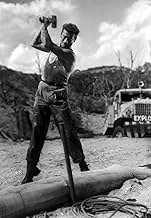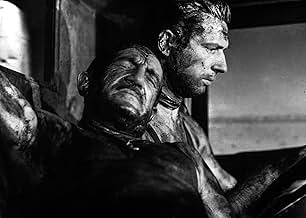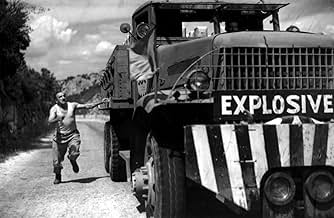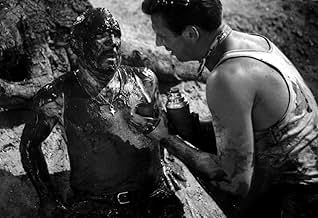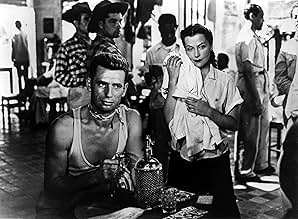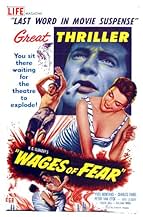En un ruinoso pueblo de América del Sur, contratan a cuatro hombres para el transporte urgente de un cargamento de nitroglicerina sin las condiciones necesarias de seguridad.En un ruinoso pueblo de América del Sur, contratan a cuatro hombres para el transporte urgente de un cargamento de nitroglicerina sin las condiciones necesarias de seguridad.En un ruinoso pueblo de América del Sur, contratan a cuatro hombres para el transporte urgente de un cargamento de nitroglicerina sin las condiciones necesarias de seguridad.
- Dirección
- Guionistas
- Elenco
- Ganó 1 premio BAFTA
- 6 premios ganados y 1 nominación en total
Peter van Eyck
- Bimba
- (as Peter Van Eyck)
Véra Clouzot
- Linda
- (as Vera Clouzot)
Darío Moreno
- Pepito Hernandez
- (as Dario Moreno)
Antonio Centa
- Camp Chief
- (as Centa)
Charles Fawcett
- Bradley
- (sin créditos)
- Dirección
- Guionistas
- Todo el elenco y el equipo
- Producción, taquilla y más en IMDbPro
Resumen
Reviewers say 'The Wages of Fear' is a gripping film about desperation and survival, with intense suspense and masterful direction by Henri-Georges Clouzot. Critics praise Yves Montand and Charles Vanel's performances and the exploration of human resilience. Some find the initial setup slow and criticize the portrayal of the American oil company. Despite this, the film is celebrated for its innovative cinematography and thematic depth.
Opiniones destacadas
My title is not an exaggeration. If you thought OJ Simpson's slow speed chase was insane, you need to change the batteries in your pacemaker and check out "Wages of Fear". This 1953 French classic tells the story of a bunch of guys who are stuck in a squalid South American village--a sort of Casablaca-esque purgatory--and will do anything to get out, even if it means getting themselves blown sky high. Slow and lazy for the first half (deliberately), the plot eventually reveals itself to be about a suicide mission to haul a zillion gallons of nitroglycerine across 300 miles of harsh terrain that would make the Coyote & Roadrunner take an early retirement.
Yes, nitro is that stuff that you don't want to look at the wrong way or it may send you to the moon. "Wages of Fear" ultimately reveals itself to be a gripping character study of how people keep their wits, or come unravelled, when subjected to pure terror... with of course the reward of heaven dangling just out of reach. So again we see this subtle allegory of purgatory, hell and heaven which I'm sure was the intent of director Henri-Georges Clouzot.
An interesting point of historical note is that when this film was released in the USA, around 15 minutes of its 150 min running time were cut. According to the Criterion mini-documentary "Censored", these cuts were largely due to the "anti-American" themes (the tyrannical oil corporation that exploits the lives of locals for the sake of a buck) as well as subtle themes of spiritual cynicism (the beautifully poetic "fence" monologue which symbolizes the absence of God/afterlife). By today's standards these censored scenes are prime time tv, but back in the 50s this movie was feared by US censors as being godless pinko propaganda. That might put a smirk on your face as you're watching this flick. But definitely look for the full 150ish minute version of this film, not the 130 min censored cut.
But really, for the entire second half there will be no smirking, only tense gritting of teeth as you watch these rolling nuke trucks inch across the South American jungle. The hazards they encounter, as well as their ingenious attempts to survive them, are extremely creative and expertly filmed with the sort of suspense that would make Hitchcock lose his breath.
Content advisory stuff: There's a scene in the beginning where a fine tarantula specimen gets squashed. After rewinding and rewatching the scene in slo-mo a dozen times, I'm almost certain that our unfortunate arachnid was a fake prop. If anyone knows differently please mention it in a review. The same scene shows a naked woman from behind, at a distance. Later in the film is a scene that shows a topless native woman from a distance--it's very artistic. Language is tame throughout the movie with maybe 1 or 2 instances of "merde" (the sh- word). While there is violence, none of it is shown explicitly on camera (some of it is disturbing, though). And unless you're a 1950s American censorship bureaucrat, there's nothing politically incendiary other than the notion that the almighty dollar is the root of much misery.
"Wages of Fear" is a well crafted, poetic, suspenseful film that certainly deserves its classic status in the history of cinema. Not unlike the classic Bogart/Lupino film "They Drive by Night" (1940), this film proves that a seemingly simple story about a bunch of truck drivers can really get your gears going.
Yes, nitro is that stuff that you don't want to look at the wrong way or it may send you to the moon. "Wages of Fear" ultimately reveals itself to be a gripping character study of how people keep their wits, or come unravelled, when subjected to pure terror... with of course the reward of heaven dangling just out of reach. So again we see this subtle allegory of purgatory, hell and heaven which I'm sure was the intent of director Henri-Georges Clouzot.
An interesting point of historical note is that when this film was released in the USA, around 15 minutes of its 150 min running time were cut. According to the Criterion mini-documentary "Censored", these cuts were largely due to the "anti-American" themes (the tyrannical oil corporation that exploits the lives of locals for the sake of a buck) as well as subtle themes of spiritual cynicism (the beautifully poetic "fence" monologue which symbolizes the absence of God/afterlife). By today's standards these censored scenes are prime time tv, but back in the 50s this movie was feared by US censors as being godless pinko propaganda. That might put a smirk on your face as you're watching this flick. But definitely look for the full 150ish minute version of this film, not the 130 min censored cut.
But really, for the entire second half there will be no smirking, only tense gritting of teeth as you watch these rolling nuke trucks inch across the South American jungle. The hazards they encounter, as well as their ingenious attempts to survive them, are extremely creative and expertly filmed with the sort of suspense that would make Hitchcock lose his breath.
Content advisory stuff: There's a scene in the beginning where a fine tarantula specimen gets squashed. After rewinding and rewatching the scene in slo-mo a dozen times, I'm almost certain that our unfortunate arachnid was a fake prop. If anyone knows differently please mention it in a review. The same scene shows a naked woman from behind, at a distance. Later in the film is a scene that shows a topless native woman from a distance--it's very artistic. Language is tame throughout the movie with maybe 1 or 2 instances of "merde" (the sh- word). While there is violence, none of it is shown explicitly on camera (some of it is disturbing, though). And unless you're a 1950s American censorship bureaucrat, there's nothing politically incendiary other than the notion that the almighty dollar is the root of much misery.
"Wages of Fear" is a well crafted, poetic, suspenseful film that certainly deserves its classic status in the history of cinema. Not unlike the classic Bogart/Lupino film "They Drive by Night" (1940), this film proves that a seemingly simple story about a bunch of truck drivers can really get your gears going.
You're living in a barren, beaten land, in South America where the lost and lonely band, no way to pay for your escape, the barrels bottom is all you scrape, this ain't the dream that had been promised, or been planned. Then your offered a way out, a chance to flee, there's a price to pay but soon you could be free, if you drive a laden lorry, you can wrap yourself in glory, $2000 you'll receive as the payee.
If only driving a wagon a few hundred miles was all there was to it. A fantastic piece of film making that demonstrates how far people can sink and what boundaries they're prepared to cross to extricate themselves from those depths.
If only driving a wagon a few hundred miles was all there was to it. A fantastic piece of film making that demonstrates how far people can sink and what boundaries they're prepared to cross to extricate themselves from those depths.
Clouzot rarely gets the attention he deserves. He made not one, but two of the greatest thrillers of all time, 'Les Diaboliques' and 'The Wages Of Fear', both perfect examples of how to make genuinely suspenseful movies that build up an amazing amount of tension. Most so-called thrillers made in Hollywood these days are thrillers in name only and could learn a lesson or two from these movie classics. 'The Wages Of Fear' could even be described as an action movie, but it is a CHARACTER DRIVEN action movie, and that's what makes it so special. Modern audiences with MTV attention spans might find the plot a little slow, but I think the first half of the movie, which deals with the motley collection of exiles in a poor Latin American town, is not only fascinating in itself, but really makes a massive impact on the second half. By taking his time introducing the characters and exploring their relationships and possible motivations, Clouzet adds depth and meaning to the rest of the exciting story, something very rarely achieved in this type of movie since. The cast, every single one of them, are flawless. The four leads, Mario, the fairly decent guy played by yves Montand, his new best friend the shifty M. Jo (Charles Vanel), his old pal the kind hearted Luigi (Folco Lulli), and the enigmatic Bimba (Peter van Eyck), are all brilliant. Great performances, taut and imaginative direction, crisp and impressive cinematography, and a handful of the most riveting sequences ever committed to film make 'Wages Of Fear' a truly unforgettable experience. Suspense movies don't come much better than this! Simply a masterpiece.
"The Wages of Fear" was awarded by unanimous verdict the Grand Prix at 1953 Cannes Film Festival where it won over 27 films, some of which were made by Jacques Tati, Alfred Hitchcock, and Luis Buñuel. Cluozot's own screenplay (based a novel by George Arnaud) focuses on four down-and-out European adventurers (Yves Montand, Folco Lulli, Peter Van Eyck, Charles Vanel) who stuck nearly penniless in a festering town in an unnamed South American country. An oil company need a load of highly dangerous and explosive nitroglycerin to be delivered to a remote well fire 300 miles away burning out of control. The route is through jungles and over crude and treacherous mountains and those men are desperate enough to take the chance. None of these men is heroic or generous, they are in for the money. The four were chosen by the managers of oil company because "if something happens to them, no one would care, they have nobody to worry about them". Henri-Georges Clouzot's view on humanity is not particularly optimistic but he finds a way to make a viewer care about disenchanted but desperate characters. Thanks to Clouzot's ability to create not only a gripping action film but a powerful study of failure, the four men will stay for long time in our memory.
10barleeku
This movie is astonishing, a gritty story filmed in an ultra-real style that relies simply on the beauty of lighting and film to achieve its stunning effects. It seems from another world, which in a way, it is. The acting is superb: Montand's Mario is full of jerky movements and intense impulses but always maintains his Gallic savoir-faire, while Charles Vanel as Jo brings, at first at least, a type of macho to the screen that modern movie-makers simply do not comprehend. The rest of the cast, especially the camp chief, Luigi, and Peter van Eyck as Bimba are incredible, as is Vera Clouzot who is incomprehensibly but believably upbeat and innocent - and totally gorgeous - in the midst of the hellhole of a town they're all stuck in. Clouzot's directing is flawless - I don't think anyone has ever squeezed more tension with just a few essential scene elements. The trucks wheeze and grunt as well as they ever have in the movies - the only comparison is Spielberg's early gem, "The Duel", but Clouzot's automotive cinematics outdo even Spielberg. The stripped down existentialism of the characters, the starkness of their shared dilemma, the grim and grimy scenery, and the cinematography itself are all of a piece. The latter is what elevates this movie to the very top rank, including some of the most dramatic and effective black and white shooting I've ever seen. Yet it never becomes mannered or gratuitous - it is orchestrated with the rise - and rise! - of tension in the film. The final scene takes on a surreal as opposed to ultra-realistic quality that has its own logic. One last word about the acting - we don't see anything like it anymore. The self-conscious mannerism of method acting (which has had its own triumphs) and the toxic awareness of everyone from the actors to the audience, the camera, directors, etc. that each actor is a celebrity and potential artiste, has ruined that conviction that actors were once larger than life people before they went on-screen, that they came to acting as an outcome of living rough, unadorned, and yet imaginative lives as opposed to shooting for fame and fortune and celebrity within an artificial corporate star-making incubator.
¿Sabías que…?
- TriviaYves Montand and Charles Vanel both suffered from conjunctivitis after filming in a pool of crude oil and being exposed to gas fumes.
- ErroresWhen Bimba is shaving in the cab of the truck, he has the right side of his face covered in shaving cream, but when he turns to talk to Luigi the right side of his face is clear of shaving cream.
- Versiones alternativasThe film was cut for U.S. distribution in 1954, in part due to scenes that denounced crooked U.S. business interests in Latin America. The Criterion Collection laserdisc restored the film to its uncut version with 21 minutes of footage removed from other versions of the film.
- ConexionesFeatured in Montand à la rencontre de Pagnol (1986)
- Bandas sonorasThe Blue Danube
Composed by Johann Strauss
Selecciones populares
Inicia sesión para calificar y agrega a la lista de videos para obtener recomendaciones personalizadas
Detalles
- Fecha de lanzamiento
- Países de origen
- Idiomas
- También se conoce como
- The Wages of Fear
- Locaciones de filmación
- Productoras
- Ver más créditos de la compañía en IMDbPro
Taquilla
- Total en EE. UU. y Canadá
- USD 21,228
- Fin de semana de estreno en EE. UU. y Canadá
- USD 7,633
- 1 dic 2024
- Total a nivel mundial
- USD 22,326
- Tiempo de ejecución
- 2h 36min(156 min)
- Color
- Relación de aspecto
- 1.37 : 1
Contribuir a esta página
Sugiere una edición o agrega el contenido que falta

![Ver Trailer [English SUB]](https://m.media-amazon.com/images/M/MV5BNWU5Zjk4MDAtZDM1Ni00YzJmLTkyZTUtYjVhN2VjNzZmOGVhXkEyXkFqcGdeQXRyYW5zY29kZS13b3JrZmxvdw@@._V1_QL75_UX500_CR0)
